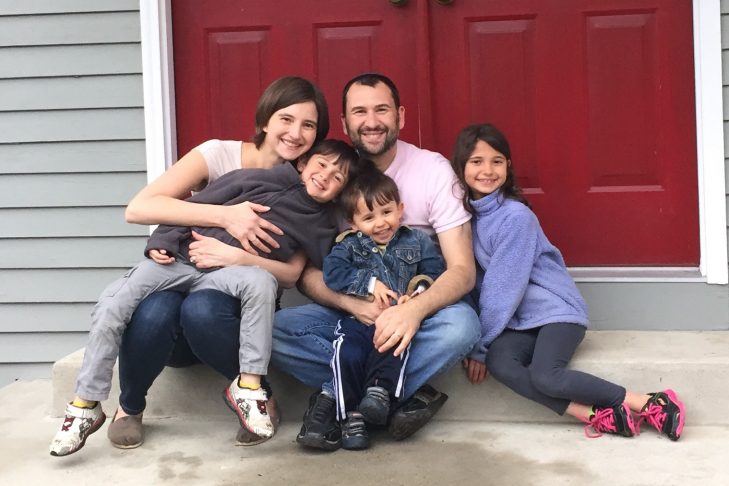Sharon’s Carrie Bornstein is a 38-year-old mom of three and the executive director of Mayyim Hayyim, a community mikveh, or ritual bath, that provides more than 1,500 immersions every year. She and her husband thought they were done having children, or so it seemed. But her work at Mayyim Hayyim led her on a new path.
“I’ve been working there for nine years, starting as a volunteer,” says Bornstein. “I was very taken from the beginning with this place that offers something that I’d never seen before in the Jewish community: an opportunity for people to pause and take stock and mark the important things that go on in our lives, whether it’s celebratory or healing. I have the opportunity to be with people during these very intense personal moments.”
And now she’s sharing her own: The author of the blog “There’s No I In Uterus” is chronicling her surrogacy as she carries a baby for a Jewish couple in London who couldn’t conceive on their own. She began exploring the surrogacy process a bit over a year ago, and she just found out that she’s pregnant.
Being pregnant is hard! Why do it again?
Related
When did the idea to become a surrogate start to feel like a possibility?
I brought it up to a friend who actually had a friend using a surrogate. She was familiar with the process. I didn’t tell my family right away, though. I think it took them a while to wrap their head around it, but they were a lot less worried than I thought they would be. My husband was completely and totally supportive, but also of course he wondered, “What if.” He has some of that, but he’s totally supportive. One of the things surrogacy agencies screen for is your support network. People do this single, and I think it’s possible to do it assuming you have other support in place, but it’d be impossible to do this with a partner who’s not supportive. My husband is just as important a link as I am. He also knows this is very tied to my work.
How did Judaism influence your choice to do this?
I wanted to do this for someone who is Jewish for a variety of reasons: I care about the Jewish people, and we as a community care about being fruitful, and everything is wrapped up in that. Knowing I was doing it for strangers still felt family-like, because they’re also Jewish.
How did the process work?
I was working with an agency, which had a connection with A Jewish Blessing, an agency that matches couples looking specifically for Jewish surrogates.
They’re partially totally excited and partially totally confused by it. We’re reading “The Kangaroo Pouch,” a good book on surrogacy. I explain it like extreme baby-sitting. I’m the oven; I’m cooking and taking care of the baby, and once I give birth, we give it back. We use that language of “giving it back” versus “giving it away.” It’s literally just returning it. We also met the couple in person; they came to the States this past summer. We introduced them as friends. We explained that they have been trying to have a baby for seven years, and my son is 7. The entire time he has been alive, they have been trying, and we’re explaining that I’m going to help.
What was it like to meet them?
I thought meeting them would be a lot more awkward than it actually was. I thought it would be some other couple just like us. They’re different in a lot of ways, and I had to wrap my head around that, but it was also very comfortable, much more so than I thought. They kept wondering how I could do it, and I really didn’t know what to tell them.
I want people to know that this is a meaningful option. I have been and I want to continue to be public about this for all these reasons. And, you know, maybe I will get a strange reaction at the grocery store, and maybe I’ll try to be funny about it, but I’m not sure about it yet.
This post has been contributed by a third party. The opinions, facts and any media content are presented solely by the author, and JewishBoston assumes no responsibility for them. Want to add your voice to the conversation? Publish your own post here. MORE




